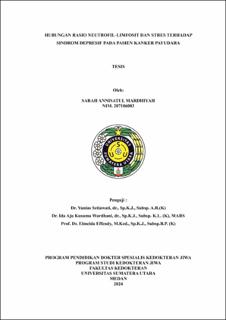| dc.description.abstract | Background: Inflammation is an essential hallmark of carcinogenesis, including breast cancer. Breast cancer patients that are comorbid with psychopathologies has a two fold increased risk of mortality. Neutrophyl lymphocyte ratio is a simple and affordable inflammatory marker, that unfortunately has not been widely studied for its usefulness in predicting stress and depressive syndrome, particularly in breast cancer patients. The aim of this study is to investigate the relationship of NLR and stress with depressive syndrome in women with advanced breast cancer.
Method: This cross sectional study consecutively recruited 71 advanced breast cancer patients who at least have completed three cycles of chemotherapy. PSS 10 and PHQ 9 are used to assess perceived stress and depressive syndrome respectively, and NLR was obtained from routine haematology test. Multivariate binary logistic was used to analyse the data.
Results: Mean age was 46.44 + 6.35, median of illness duration was 5 years (2
9), most prevalent breast cancer stage was stage IV (49.3%). Most subjects were high school graduates (85.9%), unemployed (76.1%), and married (97.2%). Increased stress and NLR were strongly correlated with incidence of depressive syndrome (r: 0,691 dan 0.683 respectively, p<0,05). Women with low grade inflammation (2 3) showed 1,52 higher risk and risk was even higher (OR = 2.36, CI 95% = 1.284 2.335) in higher NLR (mild moderate inflammation). The cut off point of RNL was found to be1.55 (sensitivity: 83%, specivicity: 79%).
Conclusion: We suggested that more clinical interest is given to women with advanced breast cancer aged 40 years or older, unemployed, not married, and were highschool graduate, with PSS score > 13 and NLR of at least 1,55 as these groups are morelikely to experience depressive syndrome. | en_US |


